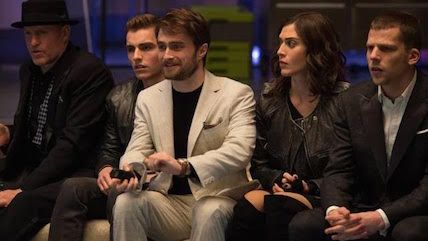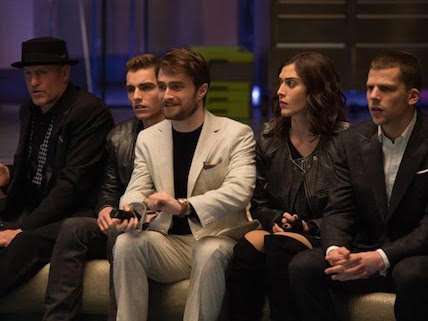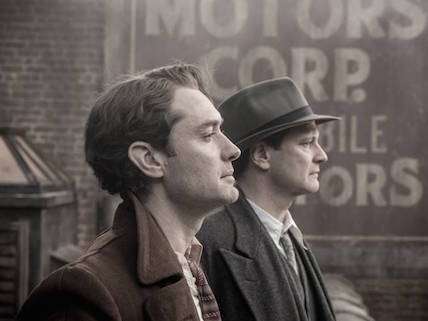Movie Reviews: Now You See Me 2 and Genius
More magic from Jesse Eisenberg and friends, none at all from Jude Law and Colin Firth.


The first Now You See Me, released in 2013, was light, breezy fun, and pretty clever, too. Critics failed to rave, but the movie went on to gross $350-million worldwide, so the iron law of sequels kicked in. Now You See Me 2 is to some extent a replay of the first film—it's another procession of jazzy magic stunts, pretzel-logic narrative twists and spirited city-hopping action, with a few (mostly) appealing new elements stirred in. It's still light, breezy and clever (maybe a little too much so this time), and it's still fun.
The team of young magicians called The Four Horsemen is back: street conjurer J. Daniel Atlas (Jesse Eisenberg); mind-controlling mentalist Merrit McKinney (Woody Harrelson); slight-of-hand specialist Jack Wilder (Dave Franco); and a new colleague named Lula (Lizzy Caplan, replacing the departed Isla Fisher), whose specialty is bloody horror-house illusions. The Horsemen are still being vaguely overseen by a mysterious magical fellowship called The Eye, and are still illicitly directed by amiable FBI agent Dylan Rhodes (Mark Ruffalo). Also returning are rotten billionaire Arthur Tressler (Michael Caine), who was thoroughly fleeced by the Horsemen in the previous film, and the ambiguous older magician Thaddeus Bradley (Morgan Freeman), who was neatly framed by the group in the last picture and has now escaped his prison cell in search of payback.
This time out, the Horsemen find themselves up against a world-class financial schemer named Walter Mabry (Daniel Radcliffe)—Tressler's rotten son. Deploying some slick magic of his own, Mabry has suddenly transported the team from Manhattan to his deluxe lair in Macau (where the movie genuflects at the altar of international market-pandering). There, he orders the Horsemen to steal a new computer chip capable of decrypting any computer in the world and hijacking its contents. Tressler himself is already lurking about, and Rhodes and Bradley soon arrive, pursued by a crew of angry FBI agents. Also on the scene—unnecessarily, I'd say—is McKinney's estranged twin brother (Harrelson in a big wig, coming on like a snark-spewing disco revenant).
The actors once again prove themselves adept at nifty card tricks and non-CGI illusions (there's one really startling mock decapitation). But new director Jon M. Chu, breaking away from the Step Up films and Justin Bieber tour docs with which he's previously been associated, also stages a couple of impressive set pieces—most memorably the infiltration of a computer facility, which is a (somewhat confusing) marvel of choreographed prestidigitation. (On the other hand, the explanations offered at the end of the film for two of the key stunts—involving an airplane and a scene of weather manipulation—are inexcusable audience cheats.)
Chu realizes that the overqualified cast is key to making these movies work, and he gives Ruffalo, especially, room to deploy his trademark emotional warmth as a man who's still mourning the loss of his magician father in a long-ago stunt-gone-wrong, and is still on the trail of the person responsible. Chu also allows the lively Caplan plenty of space to establish her new character; unfortunately, the wisecracking sparkle she brings to the film's early scenes grows tiring as the story evolves. Less overbearing are a pair of other newcomers, the proprietors of "Macau's oldest magic shop": a personable young guy named Li (Jay Chou) and his wizened mom (Tsai Chin). I think it's safe to assume we'll be seeing more of these two in the fairly near future—Now You See Me 3 is already a go project.

Genius
Movies about writers present a fundamental problem. A traditional author at work—scribbling away or tapping at his typewriter, staring for long stretches at sheets of blank paper awaiting more words—offers little in the way of visual interest. Genius, a first film by the celebrated English theater director Michael Grandage, has not surmounted this problem, and has in fact compounded it. The movie attempts to tell the story not only of the legendary writer Thomas Wolfe (Jude Law), but also his legendary editor, Maxwell Perkins (Colin Firth), a man whose own job, in movie terms, is equally uninteresting to observe: we see him hunched over manuscripts, striking out lines and whole paragraphs with a nubby pencil, and that's about it.
In trying to open up this tale, adapted from a 1978 biography by A. Scott Berg, Grandage mis-directs his stars to woeful effect. Law, playing Wolfe as a cliché life-force artist, has been encouraged to over-act throughout, waving his arms and braying his lines in a thick accent ("Ah wudden't even gon' come") meant to be redolent of Wolfe's North Carolina origins. (At some points this skillful actor might be impersonating Elmer Gantry.) Firth, on the other hand, has been drained of energy: his Perkins is unwaveringly dull and glum and plodding, much like the movie itself.
The story begins in New York in the late 1920s, where we get more close-ups of pedestrian feet trudging the rain-slicked pavements than are really necessary. We find Perkins in his airless office at Charles Scribner's Sons, where he has previously shaped the works of F. Scott Fitzgerald and Ernest Hemingway. He receives a manuscript—a monster of more than 1100 pages—which has apparently been rejected by every other publisher in town. It is the larval version of Wolfe's 1929 bestseller, Look Homeward, Angel, and Perkins is immediately captivated. (In voiceover, we hear Law reciting such famous lines as "Which of us is not forever a stranger, and alone?") Perkins sets right to work with his pencil, and quickly realizes what a daunting editorial task lies ahead of him—one paragraph he encounters is four pages long.
Perkins and Wolfe walk and talk through the richly set-designed streets of New York, with Wolfe declaiming things like, "What is Manhattan but an isle full of noise?" He takes Perkins to a black jazz club so that he can "experience the dark rhythms" that inspire him. Eventually we meet Aline Bernstein (Nicole Kidman, giving the film's most carefully measured performance), a theatrical stage designer who has abandoned her marriage to a wealthy stockbroker in order to live with and financially support Wolfe. (Aline's latest project is a production of Peter Pan, and in a knowing aside to Perkins, she says, "Lost Boys—we know a few of them, don't we?")
Also turning up is Scott Fitzgerald (Guy Pearce, ruefully funny), a man tormented by his wife Zelda's deteriorating mental state and by his own losing struggle to make a living as a writer. ("I should have died when I was twenty-four, right after This Side of Paradise.") Hemingway (Dominic West) puts in a brief appearance, too, in a rare sunny scene set in Key West. (He judges Wolfe's second bestseller, Of Time and the River, to be "crap—he's starting to believe what they're saying about him.")
There's no narrative tension to any of this. Wolfe comes to resent the growing popular perception that it's Perkins' guidance that is really responsible for his success, and eventually the two men start drifting apart. We're meant to see that Perkins, the father of five daughters, looks upon Wolfe as the son he never had, but this seems a banal observation. (What we're meant to make of the fact that Perkins never removes his period fedora, even while dining at home with his family, is unclear. And when he finally does doff the hat, at the very end of the picture, it's hard to imagine what we could be meant to think.)
Even at its most animated, Genius is slow and sparkless; it drags from beginning to end. You may wonder who the audience for this movie is supposed to be. Then you may wonder if there is one.


Show Comments (20)